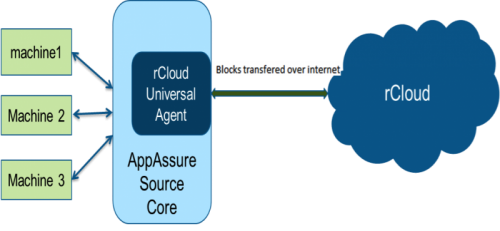Does your cloud backup and disaster recovery provider integrate with your on-premise solution? That's a key aspect to consider when setting up BDR in the cloud today, and here's how it works at rCloud.
December 20, 2013

By Accelerite Guest Blog
There is a key aspect to consider when setting up disaster recovery in the cloud today: integrating the onsite backup or replication solution that a client might have with their cloud backup and recovery solution. This is an area where an MSP will find various options. Several solutions for cloud-based disaster recovery will only integrate with a specific on premise backup provider. If you use any other on premise backup product, you are out of luck. The other approach is to setup a BDR (backup and disaster recovery) appliance as part of the solution. This poses similar problems by forcing an MSP to change their current operational procedures and requires installations across all your customer sites.
In rCloud, we have taken a “universal approach”. Our cloud is completely based on our own technology and doesn’t rely on BDR technology of any vendor. We support a range of onsite backup and replication solutions, and if we don’t support your on premise BDR of choice, we can bring it to market in a short period of time. This approach eliminates the need for additional hardware at the client site or any change in your current onsite backup procedures.
Integration with vSphere
In the world of cloud, it is difficult to miss an environment using vSphere for virtualization and rCloud works seamlessly in such environments. The rCloud agent on the ESX host takes snapshots of the virtual environment and sends changes up to the rCloud servers. Consequently, the backups can be spun up quickly in the case of a disaster at the customer site and failover in the cloud.
rCloud also supports simultaneous recovery for multiple servers so that you can restore your entire production environment with minimal downtime. This includes support for virtual networking eliminating the need for any changes to application configurations. However, do keep in mind that for inbound connectivity to the rCloud instances, DNS records will have to be updated.
We also realize that to take advantage of cloud, customers migrate virtual machines to different hosts using vMotion periodically for capacity, availability and other reasons. Even in those scenarios, the rCloud agent communicates with vCenter and maintains backup continuity for virtual servers.
Integration with Dell AppAssure and StorageCraft ShadowProtect
Several MSPs already use a solution such as Dell AppAssure for on premise backup and recovery of their machines. rCloud integrates in such an environment as shown in the diagram below.

The AppAssure core is where all the machines’ backup reside. The rCloud universal agent installs on top of the AppAssure source core and connects that environment with rCloud. As a result, an MSP can import individual machines into rCloud that had been saved onto the AppAssure core. Once imported, the restore process is standard across the board and virtual machine instances of the backup machines can be up in less than 15 minutes. An MSP goes through a similar process when interfacing with StorageCraft ShadowProtect.
As you have seen, rCloud integrates with several environments that an MSP might have for on premise backup and restore. With the Universal Architecture approach, we are well positioned to scale and integrate with a wide variety of such on premise backup and recovery solutions.
For more information, please visit our website. Look forward to hearing from you and continuing this discussion with you next month with additional thoughts to help your business.
 Vikram Gulati is Director of Product Marketing at Persistent Systems, a global company specializing in software product and technology innovation. The rCloud offering from the products division provides innovative capabilities for Disaster Recovery as a Service (DRaaS) for small and mid-sized businesses. With a global team of more than 6,500 employees, Persistent has customers spread across North America, Europe and Asia. Today, Persistent focuses on developing best-in-class solutions in four key next-generation technology areas: Cloud Computing, Mobility, Analytics and Social.
Vikram Gulati is Director of Product Marketing at Persistent Systems, a global company specializing in software product and technology innovation. The rCloud offering from the products division provides innovative capabilities for Disaster Recovery as a Service (DRaaS) for small and mid-sized businesses. With a global team of more than 6,500 employees, Persistent has customers spread across North America, Europe and Asia. Today, Persistent focuses on developing best-in-class solutions in four key next-generation technology areas: Cloud Computing, Mobility, Analytics and Social.
You May Also Like
